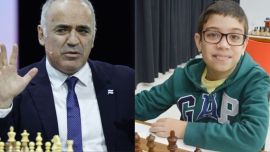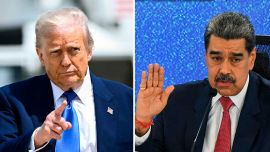A combative and challenging character, Cristina Fernández de Kirchner, the former president who has dominated Argentine politics for almost two decades along with her late husband, has long provoked both love and hate from the public.
The 69-year-old survived an attempt on her life Thursday when a man tried to shoot her near her home in Recoleta, Buenos Aires.
"Cristina remains alive, because for a reason that has not yet been technically confirmed, the gun, which contained five bullets, did not fire despite the trigger having been pulled," President Alberto Fernandez said in an address to the nation.
"This is the most serious event that has happened since we restored democracy" in 1983, he declared.
Fernández de Kirchner, vice-president since 2019, is a divisive figure in Argentina who is currently standing trial for corruption charges.
Prosecutors allege she defrauded the state while awarding public works contracts in her political stronghold of Patagonia. They are pushing for a 12-year prison sentence and a lifetime ban from politics.
Next week, the defence will begin to present its case in the trial. A verdict is expected at the end of the year.
Fernández de Kirchner has remained defiant. In an impassioned speech last week, she said Argentina's justice system is seeking to persecute Peronism, the popular political ideology based on the legacy of former ruler Juan Perón that she is associated with.
"It's not a trial against me; it's a trial of Peronism, of the national and popular governments," she said.
Her supporters have in recent days gathered outside her home in the upscale Recoleta neighbourhood.
On Thursday night, the attacker hid among a crowd clamouring for autographs.
'Always together'
Fernández de Kirchner has long cultivated the memory of her husband, former president Néstor Kirchner, who died in 2010.
He turned the country around off the back of booming demand for its agricultural exports and his tough negotiations to restructure most of the country's US$100 billion in privately held debt.
The politically minded duo were married when they were still law students at the National University of La Plata, where they were followers of Peronism.
"Since I met Néstor we never separated again, we were always together," Fernández de Kirchner wrote in her best-selling memoir Sinceramente.
They had two children together: Máximo, a lawmaker, and Florencia, a filmmaker.
The couple were detained for 17 days in January 1976, shortly before the coup that established Argentina's previous military dictatorship.
After their release, they worked in a law firm they had set up in the southern city of Río Gallegos, which was successful and helped them amass a fortune that includes more than 20 properties in Patagonia, according to Cristina.
Their political careers began after years of military dictatorship came to an end in 1983.
Nestor started out as mayor of Río Gallegos before becoming governor of the Santa Cruz Province. Cristina was a senator for the same province.
Finally, the two each became president in a concerted plan.
She launched her presidential candidacy after her husband's first gubernatorial term "to ensure over time a virtuous political process of transforming the country," she says in her book.
The daughter of a bus driver and a housewife, Cristina Fernández de Kirchner is the eldest of two sisters. She often speaks of her lower middle-class origins, but makes no secret of her preference for luxury brands.
Political legacy
Fernández de Kirchner's time in government was characterised by protectionist policies and social welfare programmes, rolling out multiple subsidies that raised public spending.
She was also close to Latin America's most famous leftist leaders. In particular, she regards Cuba's Fidel Castro and Venezuela's Hugo Chávez with affection.
Under her stewardship Argentina also became a regional bastion of LGBTQ rights, allowing gay marriage in 2010 and passing a gender identity law in 2012.
As president of the Senate, Fernández de Kirchner last year confirmed a landmark decision to legalise abortion in Argentina.
Yet in recent years, she has been implicated in a dozen separate government investigations, including over allegations of bribery and money-laundering.
Kirchner has been acquitted in several of those probes, but five are still pending.
As president of the Senate, she enjoys parliamentary immunity, granting her some legal protection.
While Kirchner still commands a large base of loyalists, her star has faded, said analyst Raúl Aragon.
"She cannot win a national election... she knows it and all of Peronism knows it," Aragon told AFP.
But having such a large bloc of supporters means that "no presidential ticket will be able to be made without an agreement with Cristina," he said.
– TIMES/AFP
























Comments